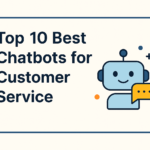Introduction to AI Agents in Business
Artificial Intelligence (AI) is no longer a buzzword—it’s a practical solution for small businesses looking to stay competitive and efficient. AI agents, essentially software programs designed to automate tasks or provide insights, have revolutionized the way small businesses operate. These agents can learn, adapt, and perform complex activities such as customer service, sales forecasting, inventory tracking, and more.
Whether you’re a solo entrepreneur or managing a small team, AI tools can help reduce manual workloads and free up time for strategic growth. Let’s dive into the top 7 powerful ways AI agents can transform small business management

1. Automating Repetitive Tasks
Common Tasks AI Can Handle
Small business owners wear multiple hats. But not every task needs a human touch. AI agents can automate:
- Scheduling meetings
- Responding to standard customer emails
- Social media posting
- Invoice generation
- Inventory tracking
By handling these repetitive tasks, AI frees up human resources for more creative and strategic work.
Tools to Get Started
- Zapier – Automates workflows between your favorite apps.
- Trello + Butler AI – Automates task organization and reminders.
- Calendly with AI – Schedules meetings and adjusts availability in real time.
2. Enhancing Customer Support with AI Chatbots
Benefits of AI Customer Service
Today’s customers expect fast responses. AI-powered chatbots offer:
- 24/7 support availability
- Reduced wait times
- Multilingual communication
- Consistent and accurate information
Examples from Real Businesses
- Domino’s Pizza uses a chatbot to take orders, reducing customer service calls by 30%.
- Small retail websites use AI tools like Tidio or Intercom to help customers navigate products, track orders, and answer FAQs.

3. Streamlining Marketing Campaigns
Personalized Campaigns at Scale
AI can analyze customer data and help you create personalized emails, product recommendations, and ads. This boosts engagement and increases conversions.
AI Tools for Marketing Automation
Mailchimp – Automates email campaigns and uses AI to optimize send times.
HubSpot – Uses AI for lead scoring and content suggestions.
Canva’s Magic Write – AI content creation for social media posts.
4. Financial Management and Predictive Analytics
Expense Tracking and Budget Planning
AI can categorize transactions, alert you to unusual spending, and create budget forecasts.
Forecasting with AI
By analyzing past sales, customer behavior, and market trends, AI tools can forecast:
- Cash flow
- Revenue spikes or slumps
- Inventory needs
Try tools like QuickBooks + AI features or Fyle for automated expense reports.
5. Inventory and Supply Chain Optimization
Real-Time Stock Monitoring
AI-powered inventory systems track stock levels in real time, preventing overstock or stockouts.
Predictive Inventory Management
AI forecasts demand based on:
- Seasonality
- Customer trends
- Market data
Tools like Zoho Inventory or TradeGecko offer AI-enhanced features for small businesses.
6. Smarter HR and Talent Management
AI in Recruitment and Onboarding
AI can:
- Filter resumes based on job descriptions
- Schedule interviews
- Automate onboarding checklists
Tools like Breezy HR and Workable simplify hiring workflows with AI agents.
Performance Tracking Using AI Tools
AI tracks employee productivity and engagement through performance metrics, enabling smarter decision-making for promotions or training.

7. Improved Decision Making with AI Insights
Business Intelligence Tools for Small Businesses
AI agents can:
- Analyze sales data
- Monitor KPIs
- Generate reports instantly
Visualizing Data for Better Understanding
Visualization tools like Tableau, Looker Studio, or Microsoft Power BI use AI to help you make sense of complex data, even if you’re not a data expert.
🛠️ Integrating AI Agents: Steps for Small Businesses
- Assess Your Needs – Identify time-consuming tasks in your business.
- Set Clear Goals – What do you want AI to achieve? (e.g., save time, boost sales)
- Choose the Right Tools – Use beginner-friendly AI software.
- Train Your Team – Teach your staff how to work with AI tools.
- Monitor and Adjust – Continuously evaluate AI performance and optimize.
⚠️ Challenges and Limitations of AI for SMEs
- Cost – Premium tools can be expensive.
- Data Security – Ensure sensitive information is protected.
- Learning Curve – New tools can require initial training.
- Overreliance – Don’t let AI fully replace human insight.
Still, the benefits far outweigh the downsides if implemented strategically.
🔮 Future of AI in Small Business Management
The AI landscape is evolving fast. Expect to see:
- Voice-based AI assistants for business tasks
- Hyper-personalized marketing
- Smarter financial planning tools
- AI-driven customer journey mapping
As technology advances, AI will become more accessible and affordable for small businesses.
❓ FAQs
1. Can AI help small businesses grow?
Yes! AI can save time, reduce costs, improve customer service, and help small businesses scale faster.
2. Is it expensive to implement AI?
Not necessarily. Many affordable tools offer free tiers or low-cost plans designed for small businesses.
3. Do I need technical skills to use AI tools?
Nope. Most modern AI tools are user-friendly with drag-and-drop features and tutorials.
4. What’s the best AI tool for a beginner?
Start with ChatGPT, Canva Magic Write, or Zapier for easy automation and content help.
5. Can AI replace human workers?
AI supports—not replaces—humans. It handles repetitive work, allowing humans to focus on creativity and decision-making.
6. How can I make sure AI doesn’t misuse my data?
Always choose tools with strong data privacy policies and secure encryption. Read the terms before sharing sensitive information.
✅ Conclusion
AI agents are no longer just for tech giants—they’re tools that can revolutionize small business management. From automating daily tasks to providing deep business insights, AI opens doors to efficiency, growth, and success.
Whether you’re just starting or looking to scale, the key is to start small, measure impact, and grow your AI capabilities over time.
Explore more at IBM’s Guide to AI for Small Businesses to dive deeper into real-world use cases.

ti279c
What a comprehensive overview.
rjuqjwlesfnqhwqhsinjizlzstnlqz